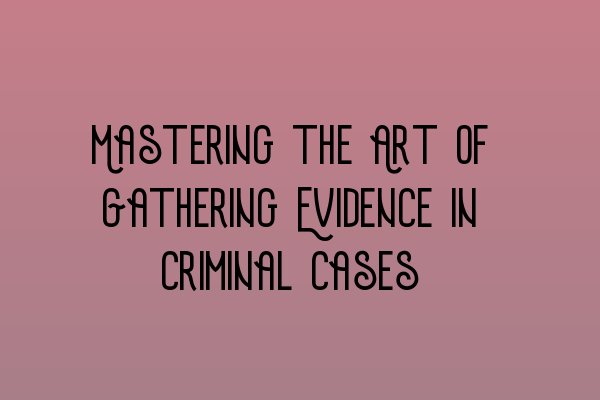Mastering the Art of Gathering Evidence in Criminal Cases
When it comes to criminal cases, gathering evidence is crucial in building a strong defense. As a solicitor, understanding the art of gathering evidence can greatly impact the outcome of your cases. In this blog post, we will explore some key strategies and techniques to help you master this important skill.
The Importance of Gathering Evidence
Before diving into the techniques, it’s important to understand why gathering evidence is essential in criminal cases. Evidence serves as the backbone of any legal argument and plays a vital role in establishing the guilt or innocence of the accused. Without solid evidence, it becomes challenging to present a compelling case in court.
Now, let’s explore some effective strategies that can improve your ability to gather evidence:
1. Conduct a Thorough Investigation
Before you can gather evidence, you need to conduct a comprehensive investigation. Start by reviewing the facts of the case, studying witness testimonies, and identifying potential areas for further exploration. By thoroughly understanding the case, you can determine which pieces of evidence are crucial in building your defense.
2. Document and Preserve Evidence
Once you identify the key pieces of evidence, it’s essential to document and preserve them properly. This includes collecting physical evidence, such as objects or substances, and documenting their condition. Additionally, photographs, videos, and audio recordings can play a significant role in supporting your arguments.
Ensure that all evidence is properly labeled, securely stored, and meets the necessary legal requirements. Failure to correctly document and preserve evidence may lead to its inadmissibility in court.
3. Interview Witnesses
Witness testimonies can make or break a case. When gathering evidence, it’s crucial to interview witnesses to extract valuable information. Prepare a list of questions in advance and conduct the interviews in a structured manner.
Listening carefully to witness testimonies, noting any inconsistencies or gaps, and cross-referencing their statements with other evidence can strengthen your defense. Gathering multiple witness testimonies can also provide different perspectives on the case, allowing you to build a more comprehensive argument.
4. Utilize Forensic Science
Forensic science can be a powerful tool in gathering evidence in criminal cases. Collaborate with forensic experts to analyze physical evidence, such as DNA samples, fingerprints, or ballistics reports. Their expertise can provide scientific support for your arguments and help establish the credibility of your defense.
5. Stay Updated with Legal Precedents
Keeping up with legal precedents is essential for any solicitor. It allows you to understand the legal landscape and leverage court decisions that support your arguments. Stay updated with recent judgments and case laws related to the evidence you are gathering.
By integrating these strategies into your practice, you can enhance your ability to gather evidence effectively. Remember, practice makes perfect, so keep refining your skills over time to become a master in the art of gathering evidence.
Related Articles:
– SQE 1 Practice Exam Questions
– SQE 1 Practice Mocks FLK1 FLK2
– SQE 2 Preparation Courses
– SQE 1 Preparation Courses
– SRA SQE Exam Dates
